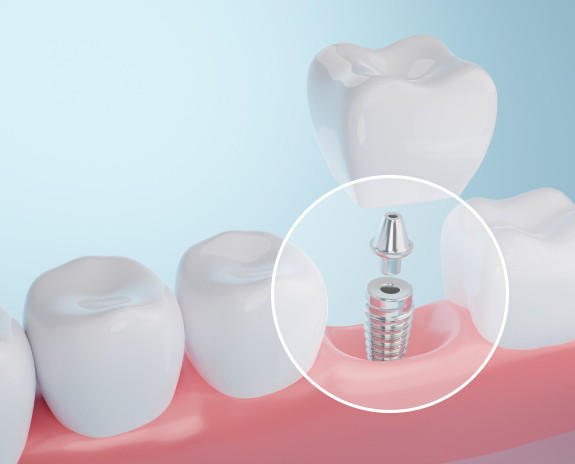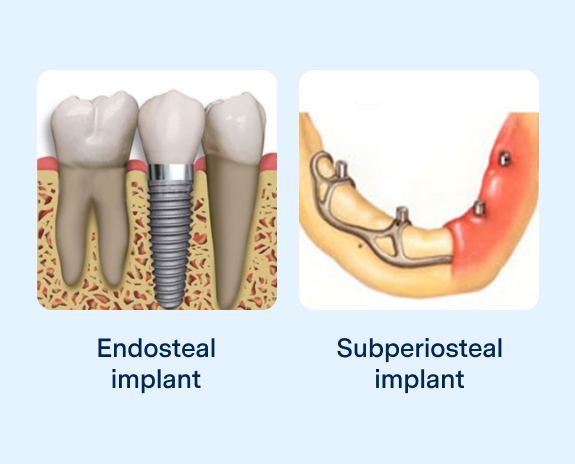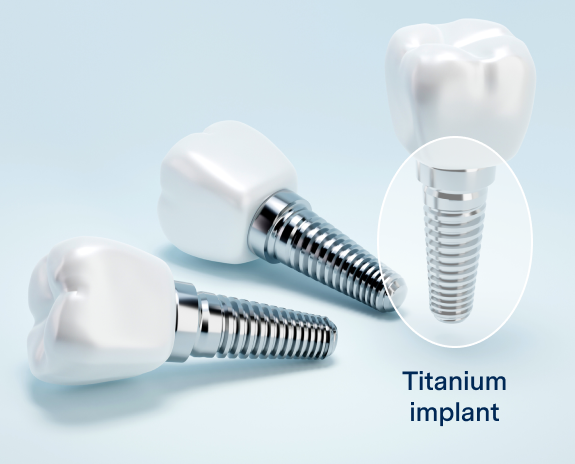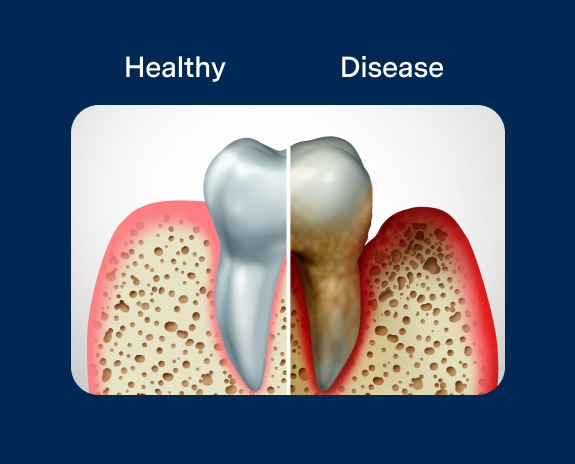Are dental implants safe? A 2022 Study
Discover Dental Implants: Safe & Lasting Tooth Replacement. Explore Benefits & Safety in 2022 Study.
Everything you need to know about the safety of dental implants, from the materials used to the expertise of the doctors installing them.
Dental implants provide a lasting smile solution for anyone needing to fill in missing teeth—but are they really safe?
The good news is, yes. Dental implants are a safe, permanent solution for anyone who is looking to replace a missing tooth. They’re also a great way to keep a natural smile and set yourself up for better oral health in the future.
In this article, we’ll explore everything you need to know about dental implants. From what they are and how they're made, to who performs the procedure, and how long they last—we’ll cover it all so you can feel more confident in deciding what’s best for your smile.
What are dental implants?
Dental implants are artificial structures that are inserted into a person’s jawbone to replace missing teeth. They look and function like real teeth and provide people with a permanent solution when a tooth has been extracted or may be missing.
An implant has a screw-like device that is implanted into the jawbone and topped with a dental crown that functions like your natural tooth. Dental implants are a safe, effective way to replace missing teeth and can provide you with a more efficient solution that doesn’t have to be removed or replaced, like dentures. They also require less maintenance than a full denture or a partial denture.

Dental implants may be used to replace one missing tooth or even an entire row of missing teeth. They are an excellent option for anyone looking for a safe, permanent solution to fill in one or multiple missing teeth.
The Two Types of Dental Implants
There are two types of dental implants to consider—endosteal and subperiosteal.

Endosteal implants
Endosteal implants are the most common and require the implant to be secured directly into your jawbone. In comparison, subperiosteal implants rest on top of the jawbone and conform with it over time.
Endosteal implants use titanium screws, or blades, inserted into your jawbone to replace the missing teeth. After a waiting period that allows the bone to mesh to the metal implant, your dental specialist will complete the process by placing an abutment to the existing screw or blade.
Subperiosteal implants
Subperiosteal implants, however, are used less frequently and are not installed directly into your jawbone. Rather they sit on top of the bone and under your gum tissue. This type of implant will conform to your jawbone over time. It also may take additional procedures to complete the process.
Why choose dental implants
Because the implant is secured into your jawbone, they are a great alternative to temporary options like partial dentures. You will not experience any movement with the new implant, and it will not cause any damage to the jawbone. However, you do need to have sufficient available bone density. If your jaw needs more support, your dentist may recommend a dental bone graft before moving forward with the implant treatment.
While dental implants may not be the right option for everyone, they are often used as a safe alternative when:
There are one or more missing teeth
The bone is strong enough to secure the implants
The oral tissues are healthy
Patients are unable or unwilling to wear dentures
Patients who want to improve speech and eating
Patients who don’t smoke tobacco
If you’re looking for an aesthetic and enduring smile solution, dental implants may be the perfect fit. Consult with your Aspen Dental dentist to learn if you qualify for dental implants.
Are dental implants safe?
Dental implants are a safe and effective way to replace missing teeth for several reasons. From the materials they are made of to the dentist or oral surgeon who installs them, these are all things to consider when looking at the safety of dental implants.
It’s also important to consider the potential safety risks of not having a dental implant installed.

Use of safe materials
The materials used in dental implants have been proven safe and are used across various medical industries.
Titanium is one of the most common materials to create implants. It’s designed to be compatible with your body and provide you with a long-lasting solution that will not degrade over time. This will help to minimize the chances of needing to replace your implants.
Potential safety concerns of not getting dental implants
Dental implants are the longest lasting smile solution on the market. Not only do they endure 25+ years when well cared for, but they look and function like your real teeth. They also boost your oral health, which in turn supports your overall health.
Once a tooth has been extracted, you’ll want to start talking to your dentist about the following steps to ensure your oral health stays in top shape. Waiting too long will leave your mouth susceptible to potential health concerns, such as gum disease, bone deterioration and the repositioning of your teeth.

Gum and bone deterioration
Your teeth play a vital role in the health of both your gums and the bones in your mouth.
The roots of your teeth help keep your gums and bones healthy. If the tooth roots are removed, your gums and bones can start to recede. By having a dental implant safely installed into the missing tooth’s space, you can replicate this natural process and avoid future health concerns.
Gum and bone irritation and deterioration where a tooth is missing look like the figure above. While there may not be a tooth in the space, your gums and bones are still susceptible to bacteria and inflammation that could wreak havoc down the road.
Having a dental implant installed shortly after your tooth has been extracted will keep your smile healthy. You can also revitalize your oral health by addressing gum and bone deterioration with dental bone graft solutions, restoring strength and stability for a healthier smile.
Repositioning of your teeth
Delaying dental implants can potentially cause your teeth to shift and become crowded. Depending on how your teeth move, it could make your oral hygiene routine of brushing and flossing more difficult, resulting in more plaque and bacteria buildup over time. This could eventually lead to needing more extensive dental work in the future.
Having dental implants installed shortly after losing or extracting a natural tooth will keep your smile healthy and your dentist happy. It will also protect your teeth from excessive treatment in the future.
Potential infection
When a tooth is extracted or missing, there is a high chance of infection.
That’s because it’s much easier for food particles or bacteria to collect in or around the dental socket. The area is especially susceptible to infection shortly after the tooth has been pulled, and bacteria can easily enter the exposed area.
Dental implants can help alleviate this issue by filling the missing tooth area and providing protection to the tissue and bone underneath.
Patients who may want to avoid dental implants
While dental implants are generally a great solution for replacing lost teeth, there are a few scenarios when dental implants may not be the best option.
Poor gum and bone health may disqualify a patient from attaining dental implants. For an implant to be successful, the gums and bone need to meet a certain standard for the implant to take. If you do not meet these health standards, it may result in a failed implant attempt.
During your next check-up with your Aspen Dental dentist, ask about the condition of your oral health to help you determine whether you are a good candidate for a safe and successful dental implant procedure.

Success rates of dental implants
Dental implants boast a high success rate of 98%. That means that dental implants are not only a safe way to replace missing teeth, they’re also a highly effective option. Since implants act almost identical to a natural tooth, they are highly recommended by dentists.
The advantages of dental implants
There are a variety of advantages to deciding to have dental implants installed. From the fact that they closely resemble your natural teeth, to them keeping your mouth and oral health in top shape, there are many benefits of getting dental implants.
Let’s look at a few of the advantages you can expect to see.
They provide a natural look and feel for your smile
One benefit of dental implants is that they are a close send to your natural teeth. They look, feel and function just like your natural teeth do. This means there’s less of a learning curve when getting used to dental implants.
It also means that cosmetically, they will have a more natural appearance and blend in with your teeth — improving your confidence and completing your smile.

When getting a dental implant, your dentist will ensure it looks as natural as possible and matches your other teeth. This will help it blend in and create a natural look when you’re talking or smiling.
Since they are installed directly into your jawbone, you won’t experience any of the downsides of dentures, such as avoiding certain hard or sticky foods. They will remain in place no matter what you choose to eat for dinner and won’t lose shape or fit over time.
Another benefit to them mimicking your natural teeth is that they won’t require any additional care beyond your typical brushing and flossing routine. Unlike other smile solutions that need you to remove, clean and soak – implants are cared for just like your natural teeth.
They are long-lasting
Once installed, dental implants are permanent fixtures. That means they should last you a long time, if not a lifetime. With proper care, they should endure 25+ years.
This means less worrying about losing or breaking a tooth and fewer visits to the dentist for unexpected dental work.
Of course, that doesn’t mean you can skip your six-month check-ups with your dental provider. You’ll want to keep those in the books to get a professional cleaning to ensure the rest of your mouth is staying healthy.
Dental implants can improve quality of life
Choosing to have dental implants installed will allow you to get back to living life on your terms.
Beyond improving your confidence and giving you a full smile back, dental implants allow you to go about your day as you normally would. There’s no need to remove or soak them, like you would with dentures. They’re a much more convenient long-term smile solution.
Dental implants are a safe tooth replacement option
Dental implants are not only a safe and effective solution, but they’ll help your smile to look and feel its best.
Knowing that everything from the materials used, to the expertise of the doctor installing them, will help you feel more comfortable with the safety of this treatment process.
If it’s time for tooth replacement, speak with your Aspen Dental dentist to see if implants are right for you.
Your welcome starts here.
Your new patient visit to Aspen Dental is our most important appointment together.

